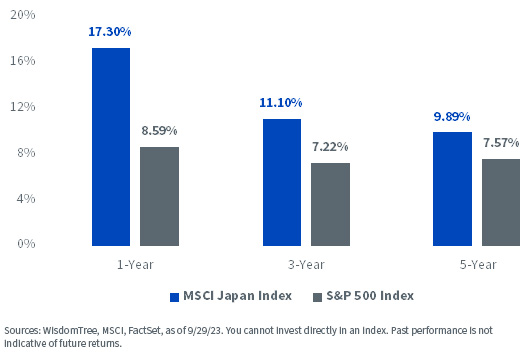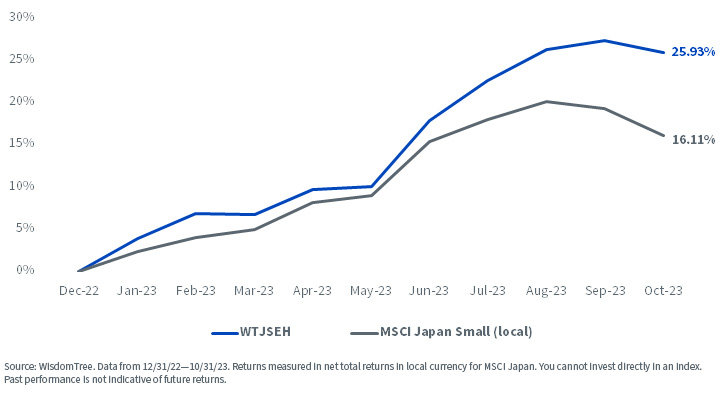

 One area of emphasis for activist investors in Japanese equities is getting companies to return excess cash to shareholders. This push seems to be working.The weighted-average dividend growth for the MSCI Japan Index has consistently outpaced that of the S&P 500 Index over one-year, three-year, and five-year periods.Weighted Average Annualized Dividend Growth, MSCI Japan Index vs. S&P 500 Index
One area of emphasis for activist investors in Japanese equities is getting companies to return excess cash to shareholders. This push seems to be working.The weighted-average dividend growth for the MSCI Japan Index has consistently outpaced that of the S&P 500 Index over one-year, three-year, and five-year periods.Weighted Average Annualized Dividend Growth, MSCI Japan Index vs. S&P 500 Index 2023 Index Reconstitution: Japanese Equity IndexesThe reconstitution of the underlying Indexes of the WisdomTree Japan Hedged Equity Fund (DXJ), the WisdomTree Japan Hedged SmallCap Equity Fund (DXJS) and DXJS’s unhedged counterpart, the WisdomTree Japan SmallCap Dividend Fund (DFJ), was effective at the close of November 8.Following the rebalance, DXJ’s Index, the WisdomTree Japan Hedged Equity Index (WTIDJH) largely maintained its sector under- and over-weights relative to the MSCI Japan Index.Japanese equities performed well year-to-date across most sectors, and WTIDJH increased allocations to the Consumer Discretionary, Consumer Staples and Materials sectors. The Index decreased its exposure to Energy and Industrials.The DXJ Rebalance: What Changed in the Index
2023 Index Reconstitution: Japanese Equity IndexesThe reconstitution of the underlying Indexes of the WisdomTree Japan Hedged Equity Fund (DXJ), the WisdomTree Japan Hedged SmallCap Equity Fund (DXJS) and DXJS’s unhedged counterpart, the WisdomTree Japan SmallCap Dividend Fund (DFJ), was effective at the close of November 8.Following the rebalance, DXJ’s Index, the WisdomTree Japan Hedged Equity Index (WTIDJH) largely maintained its sector under- and over-weights relative to the MSCI Japan Index.Japanese equities performed well year-to-date across most sectors, and WTIDJH increased allocations to the Consumer Discretionary, Consumer Staples and Materials sectors. The Index decreased its exposure to Energy and Industrials.The DXJ Rebalance: What Changed in the Index Looking at small caps, DFJ’s Index, the WisdomTree Japan SmallCap Dividend Index (WTJSC), increased allocations to Information Technology companies and dropped allocations to Financials, Energy and Materials, relative to the MSCI Japan Small Cap Index.The DFJ Rebalance: What Changed in the Index
Looking at small caps, DFJ’s Index, the WisdomTree Japan SmallCap Dividend Index (WTJSC), increased allocations to Information Technology companies and dropped allocations to Financials, Energy and Materials, relative to the MSCI Japan Small Cap Index.The DFJ Rebalance: What Changed in the Index Year to date, the WisdomTree Japan Hedged Equity Index outperformed the MSCI Japan Index by almost 13%, and the WisdomTree Japan Hedged SmallCap Equity Index (WTJSEH) outperformed the MSCI Japan Small Cap Index by almost 10%. The WisdomTree Japan SmallCap Dividend Index outperformed the MSCI Japan Small Cap Index by more than 3%.WisdomTree Japan Hedged Equity Index (WTIDJH) vs. MSCI Japan YTD Returns
Year to date, the WisdomTree Japan Hedged Equity Index outperformed the MSCI Japan Index by almost 13%, and the WisdomTree Japan Hedged SmallCap Equity Index (WTJSEH) outperformed the MSCI Japan Small Cap Index by almost 10%. The WisdomTree Japan SmallCap Dividend Index outperformed the MSCI Japan Small Cap Index by more than 3%.WisdomTree Japan Hedged Equity Index (WTIDJH) vs. MSCI Japan YTD Returns-vs,-d-,-msci-japan-ytd-returns.jpg?h=401&w=707&hash=EE970C9E36311C95A98EC541679641B6) WisdomTree Japan Hedged SmallCap Equity Index (WTJSEH) vs. MSCI Japan Small Cap YTD Returns
WisdomTree Japan Hedged SmallCap Equity Index (WTJSEH) vs. MSCI Japan Small Cap YTD Returns WisdomTree Japan SmallCap Dividend Index (WTJSC) vs. MSCI Japan Small Cap YTD Returns
WisdomTree Japan SmallCap Dividend Index (WTJSC) vs. MSCI Japan Small Cap YTD Returns-vs,-d-,-msci-japan-small-cap-ytd-returns.jpg?h=392&w=705&hash=057D2B8ADF960F16369EAF390DF29EBC) Following the annual rebalance, profitability metrics and distributions of the WisdomTree Japan Hedged Equity Index remain higher than those of its benchmark, the MSCI Japan Index. The WisdomTree Japan SmallCap Dividend Index saw improvements to its dividend yield, return on assets, and return on equity following its rebalance, and its price-to-earnings decreased from 13.2x to 11.9x post-rebalance.Rebalance Fundamentals Comparison
Following the annual rebalance, profitability metrics and distributions of the WisdomTree Japan Hedged Equity Index remain higher than those of its benchmark, the MSCI Japan Index. The WisdomTree Japan SmallCap Dividend Index saw improvements to its dividend yield, return on assets, and return on equity following its rebalance, and its price-to-earnings decreased from 13.2x to 11.9x post-rebalance.Rebalance Fundamentals Comparison More By This Author:ETFs: A Smart Choice For Tax-Loss HarvestingNarrow Market Leadership Doesn’t Equal Frothy ValuationsFed Watch: In A Holding Pattern
More By This Author:ETFs: A Smart Choice For Tax-Loss HarvestingNarrow Market Leadership Doesn’t Equal Frothy ValuationsFed Watch: In A Holding Pattern
















